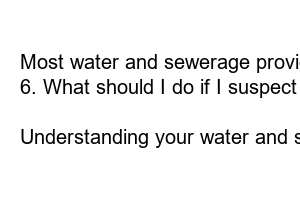상하수도 요금 조회
Title: Everything You Need to Know About Water and Sewerage Bill Inquiry
Introduction:
Managing and understanding your water and sewerage bills can sometimes be confusing and overwhelming. However, it’s essential to have clarity regarding your bills and know the proper steps for addressing any inquiries or concerns you may have. In this blog post, we will explore everything you need to know about water and sewerage bill inquiries, ensuring you have a smooth experience with this vital aspect of your household expenses.
1. Why is Understanding Your Water and Sewerage Bill Important?
Knowing how to decipher your water and sewerage bill is crucial for effective budgeting and tracking your usage. By understanding the breakdown of charges and monitoring your consumption patterns, you can identify areas for potential cost-saving measures and make informed decisions for optimizing water usage.
2. How to Read Your Water and Sewerage Bill:
Your water and sewerage bill typically comprises various sections conveying important information. These sections commonly include details about your consumption, billing period, meter readings, tariff structure, and applicable charges. *Highlight and bold key points* such as total consumption, charges per unit, and any additional fees like service charges or late payment penalties.
3. Understanding Meter Readings:
Meter readings form the basis for calculating your consumption and subsequent charges. They reflect the amount of water consumed during a specific billing period, expressed in cubic meters (m³) or gallons. Keep an eye on your meter readings and ensure they are accurately reflected in your bill to avoid discrepancies or overcharges.
4. How to Dispute Billing Errors:
In the event of a billing error or discrepancy, it’s crucial to take prompt action and contact your water and sewerage provider. Provide accurate details and evidence to support your claim, such as meter readings or previous bill statements. They will investigate your inquiry and rectify any errors or miscalculations, ensuring you are charged accurately.
5. Tips for Efficient Water Usage:
Conserving water not only benefits the environment but also reduces your bills. Consider implementing water-saving practices such as fixing leaky faucets, using low-flow devices, and practicing responsible water usage habits. Be aware of any water-saving initiatives or incentives offered by your water and sewerage provider to help you save both water and money.
6. Contacting Your Water and Sewerage Provider:
In case you have any specific questions or concerns regarding your water and sewerage bill, it’s essential to reach out to your provider directly. Ensure you have their contact information readily available and be prepared with any necessary details to expedite the resolution process. Most providers offer various contact channels, including phone, email, and online inquiry forms.
Frequently Asked Questions (FAQs):
1. How often will I receive my water and sewerage bill?
Typically, water and sewerage bills are sent monthly or quarterly, depending on your provider’s billing cycle.
2. Can I set up automatic bill payments?
Yes, many water and sewerage providers offer the convenience of automatic bill payments, ensuring timely settlements and reducing the likelihood of late fees.
3. What if I cannot afford to pay my bill in full?
If you are facing financial difficulties, it is advisable to contact your water and sewerage provider as they may offer flexible payment options or assistance programs.
4. How do I notify my provider about a change in address?
Inform your water and sewerage provider as soon as possible about any change in address to ensure seamless communications and correct billing information.
5. Can I access my bill and consumption information online?
Most water and sewerage providers have online portals where you can conveniently access your bills, consumption details, and other relevant information.
6. What should I do if I suspect a water leak on my property?
If you suspect a water leak on your property, contact your water and sewerage provider immediately. They will guide you through the necessary steps to locate, assess, and repair the leak.
Summary:
Understanding your water and sewerage bills is essential for effective budgeting and optimizing water consumption. Taking the time to navigate through your bill, understanding meter readings, and addressing any inquiries promptly can save you money and ensure accurate charges. Remember to implement water-saving practices and contact your provider for any specific concerns, ensuring a smooth and efficient experience with your water and sewerage bill inquiries.

